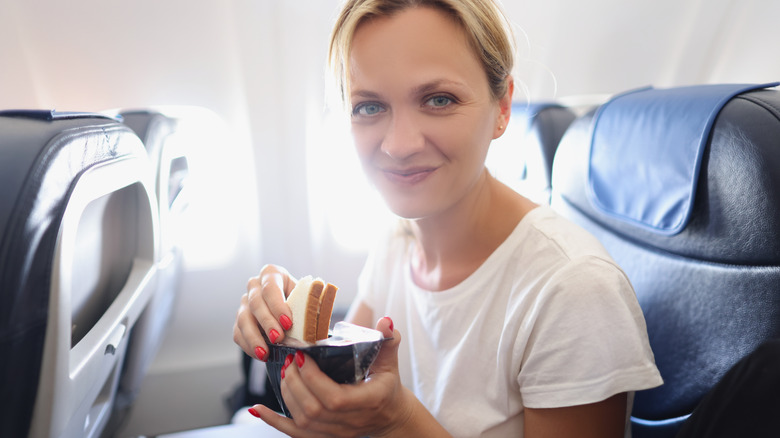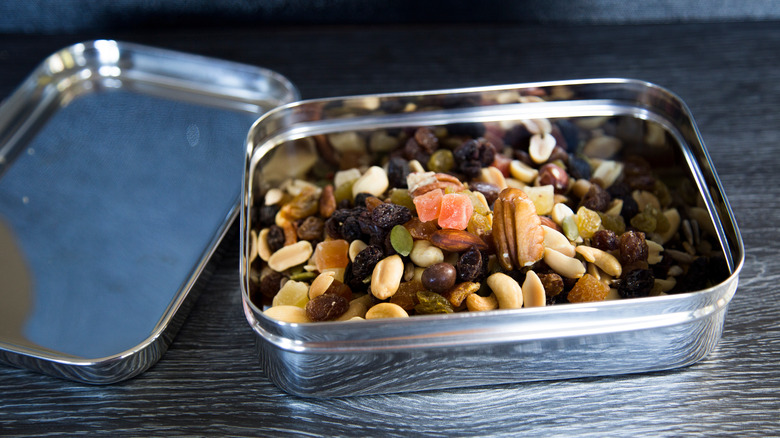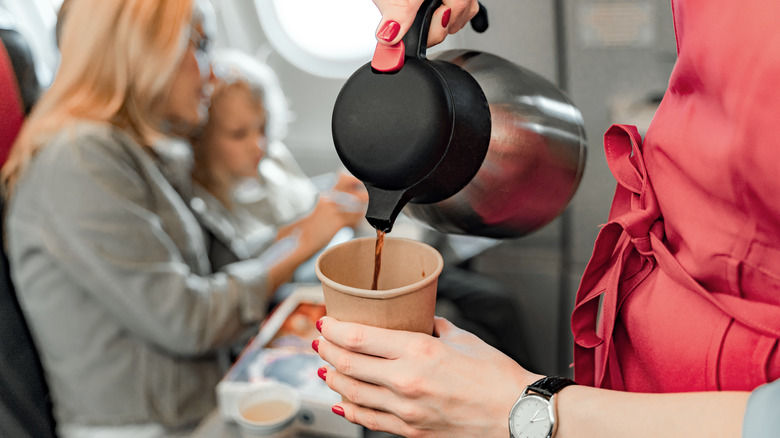Try Eating These Snacks To Help Reduce Jet Lag
Jet lag is the unavoidable sacrifice you must make when traveling across several time zones. Or is it? Researchers have discovered the easy tweaks that could help you conquer jet lag, starting with the food you eat. In case you need a refresher, jet lag, according to Mayo Clinic, occurs when your body clock doesn't match the time zone you're in. So when it's time to go to bed in your travel destination, you're wide awake, as if you were still in your home country. The opposite can happen too. Daytime fatigue is a hallmark symptom of jet lag and can seriously interfere with your travel plans.
Thankfully, jet lag doesn't have to get you down on your next trip. Researchers at the University of Sydney partnered with Qantas Airways to find out how to reduce jet lag for travelers taking long-haul flights. They studied multiple factors, from plane lighting to in-flight exercise, but one of the easiest tidbits to replicate might be the researchers' findings on food choices. Based on the study, you should pack two surprising ingredients in your travel bag: chili and chocolate.
Chili and chocolate may help you deal with jet lag
Chili and chocolate might not seem like conventional food choices when traveling, but according to the University of Sydney and Qantas team, these two ingredients can help fight jet lag. The West Australian previously reported that chocolate was chosen by researchers because of its anti-inflammatory properties. Chili was thought to combat jet lag symptoms due to its vitamin C content, decongestant properties, and relief of pain and digestive issues. However, Qantas adds on their website that spicy foods like chili can keep you alert, so it's best to consume them when you want to stay awake — not just before your in-flight nap.
The research team also revealed that tryptophan-rich foods are useful for overcoming jet lag, and for triggering the release of the snooze-inducing hormone melatonin. These foods include milk, turkey, chicken, oats, nuts and seeds, fruits, and yes, chocolate.
Though the researchers' aim was to create a menu for Qantas' long-haul flights, you can steal their tips when choosing your own flight snacks and meals. Start by packing spicy chili-flavored chips, which will come in handy at times when you need to stay awake. Then, to aid in sleep, try munching on a bag of trail mix containing nuts and chocolate. If you're given a meal choice on your flight, opt for chicken or turkey when possible, and try to wind down for a nap soon after.
Which foods and drinks to avoid
Nibbling on chocolate and chili-flavored snacks might help with jet lag, but that's not the only dietary advice you should follow. Experts also urge travelers to watch out for certain foods and drinks that can worsen jet lag symptoms. Healthline suggests cutting back on salt and sugar during your flight and being mindful to not overeat. Just because you packed all those snacks doesn't mean you have to finish them in the air, especially if you don't feel hungry. It's also a good idea to avoid drinking alcohol before or during your travels since it can make it harder to get quality shut-eye.
You may wonder if you can simply pop a melatonin tablet when you need to sleep and chug coffee when you need to stay awake. The NHS notes that melatonin can help treat jet lag, though it recommends taking the supplement after you've arrived at your destination. As for caffeinated beverages, it might be best to abstain before and during your flight. According to the World Health Organization, caffeine is a diuretic, meaning your body will flush out fluids more quickly than usual. As a result, you may become dehydrated while traveling, which can exacerbate jet lag symptoms. Instead of relying on in-flight coffee and tea, fill up a water bottle in the airport (after security, of course) to stay hydrated while traveling.


